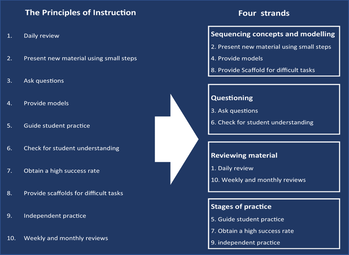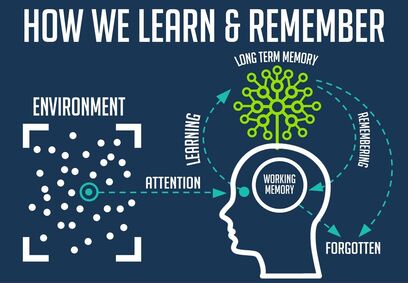Teaching and Learning at Sidmouth College
Teaching & Learning is our priority; if we are getting it right in every lesson, every day then everything else will follow.
The core guiding principle that lies at the heart of everything we do at Sidmouth College is to encourage and develop capacity to learn among all members of our community. We believe that learning is the process by which students gradually acquire and assimilate knowledge, concepts, skills, and attitudes to enable them to make greater sense of the world.
At Sidmouth College we empower our students to take control of their own learning and their own lives so they know how to make good choices and also have the ability to thrive in a fast moving, ever changing world.
"We must remember that we are preparing our children not simply for employment… and for the contribution they can make to the common good… but for the difficult decisions they will have to make in their personal lives, in those moments when they have to take responsibility for themselves…"
Michael Morpurgo
Teaching and learning is central to our work as educators and it stems from the school’s aims, ethos and vision. We expect all of our staff to deliver high quality, stimulating and dynamic lessons, where all students are supported and challenged to enjoy and make good progress in their learning.
Students of all ability levels will be given equal opportunities to learn in order to achieve their full potential. Our purpose is to create a learning environment which fosters motivation and allows all students to flourish. We strive not to simply teach knowledge but to empower our students by teaching them how to learn.
The core guiding principle that lies at the heart of everything we do at Sidmouth College is to encourage and develop capacity to learn among all members of our community. We believe that learning is the process by which students gradually acquire and assimilate knowledge, concepts, skills, and attitudes to enable them to make greater sense of the world.
At Sidmouth College we empower our students to take control of their own learning and their own lives so they know how to make good choices and also have the ability to thrive in a fast moving, ever changing world.
"We must remember that we are preparing our children not simply for employment… and for the contribution they can make to the common good… but for the difficult decisions they will have to make in their personal lives, in those moments when they have to take responsibility for themselves…"
Michael Morpurgo
Teaching and learning is central to our work as educators and it stems from the school’s aims, ethos and vision. We expect all of our staff to deliver high quality, stimulating and dynamic lessons, where all students are supported and challenged to enjoy and make good progress in their learning.
Students of all ability levels will be given equal opportunities to learn in order to achieve their full potential. Our purpose is to create a learning environment which fosters motivation and allows all students to flourish. We strive not to simply teach knowledge but to empower our students by teaching them how to learn.
Classroom consistencies at Sidmouth College
Our classroom consistencies highlight aspects of pedagogy, culture and literacy that should be embedded within all lessons. They improve consistency and ensure high quality teaching and learning takes place across the College.
Students are able to recognise the key ingredients within the teaching and learning offer within the College and understand how they are used to help students ‘know and remember more’. You can view our classroom consistencies here.
Our classroom consistencies have Rosenshine’s Ten Principles of Instruction within them, along with the Willingham Model of Memory seen below. These are incorporated into our daily practice.
Students are able to recognise the key ingredients within the teaching and learning offer within the College and understand how they are used to help students ‘know and remember more’. You can view our classroom consistencies here.
Our classroom consistencies have Rosenshine’s Ten Principles of Instruction within them, along with the Willingham Model of Memory seen below. These are incorporated into our daily practice.
Rosenshine’s Ten Principles of Instruction
 The Four Strands - Click to enlarge
The Four Strands - Click to enlarge
Barak Rosenshine (1930-2017) began his career as a high school history teacher, studied for a PhD at Stanford university and then became a professor in the Department of Educational Psychology at the University of Illinois.
The Ten Principles were published in 2010 by the International Academy of Education (IAE) and are taken from three distinct areas of research
Rosenshine’s Principles in Action. These can be placed into four strands (Tom Sherrington)
How do we use these in practice?
These are not a lesson by lesson checklist. They should lift you up, not tie you down! They fit within our Teaching Principles.
How do the ten principles or the four strands apply in each curriculum area?
There is always knowledge; there is always practice; there is always a role for checking for understanding – but the way these things take form varies significantly between subjects. This diagram demonstrates Rosenshine’s theory being put into practice in the classroom.
How do we ‘Learn and Remember’?
To be successful in the learning process both staff and students have to understand both, how we learn and also, how our memory works to enable students to ‘Learn and remember more’. Staff have received professional development around memory and cognitive load to underpin the work around retrieval. Students have been introduced to a model of learning which has been developed by Psychologists to explain how we learn and remember key knowledge.
This model of learning is embedded within the classroom and used by staff and students to explain the ‘How of learning’.
The Ten Principles were published in 2010 by the International Academy of Education (IAE) and are taken from three distinct areas of research
- Research on how our brain acquires and uses new information: cognitive science
- Research on the common classroom practices of those teachers whose students show the highest gains: observational studies of ‘master teachers’
- Findings from studies that taught learning strategies to students: testing cognitive supports and scaffolds that help students learn complex tasks.
Rosenshine’s Principles in Action. These can be placed into four strands (Tom Sherrington)
How do we use these in practice?
These are not a lesson by lesson checklist. They should lift you up, not tie you down! They fit within our Teaching Principles.
How do the ten principles or the four strands apply in each curriculum area?
There is always knowledge; there is always practice; there is always a role for checking for understanding – but the way these things take form varies significantly between subjects. This diagram demonstrates Rosenshine’s theory being put into practice in the classroom.
How do we ‘Learn and Remember’?
To be successful in the learning process both staff and students have to understand both, how we learn and also, how our memory works to enable students to ‘Learn and remember more’. Staff have received professional development around memory and cognitive load to underpin the work around retrieval. Students have been introduced to a model of learning which has been developed by Psychologists to explain how we learn and remember key knowledge.
This model of learning is embedded within the classroom and used by staff and students to explain the ‘How of learning’.
1. Our memory is split into two parts: Working Memory & Long-Term Memory.
2. When we focus our attention on something, that information is stored in our working memory.
3. But if we don’t revisit that information later that lesson/ day/week...it will be forgotten.
4. However if we do revisit the information, later that hour/day/week, it will also be stored in long term memory.
5. But this information will also leave our long-term memory and be forgotten over time.
6. That is unless we revisit the information again and again overtime.
7. Ultimately, the more we revisit information (through re-learning and retrieval), the stronger the neural pathways and the stronger the schemata of that information & related info.
1. Our memory is split into two parts: Working Memory & Long-Term Memory.
2. When we focus our attention on something, that information is stored in our working memory.
3. But if we don’t revisit that information later that lesson/ day/week...it will be forgotten.
4. However if we do revisit the information, later that hour/day/week, it will also be stored in long term memory.
5. But this information will also leave our long-term memory and be forgotten over time.
6. That is unless we revisit the information again and again overtime.
7. Ultimately, the more we revisit information (through re-learning and retrieval), the stronger the neural pathways and the stronger the schemata of that information & related info.
Aims of Learning and Teaching within Sidmouth College
- To provide a personalised learning experience for every child that takes full account of their individual needs’, interests and aspirations.
- To challenge and inspire all students to be successful learners and in being so reach their academic potential or beyond.
- To ensure that our students are active and independent learners who strive to achieve their best in every learning situation and will continue to do so throughout their lives.
- To ensure that students are highly literate and numerate, able to apply their skills and knowledge to new and different situations, to achieve well in school and beyond.
- To make links with the learning that students do outside the classroom.
- To embed a rigorous quality assurance programme, focusing on the continual raising standards of teaching and learning in the school, to inspire and motivate students and staff.
- To identify and share good practice in teaching and learning across all curriculum areas.
- To provide guidelines for teaching and learning and establish clear criteria for best practice and consistency.
Coaching at Sidmouth Colleg
At Sidmouth College we know that the quality of the teaching in our classrooms has an enormous impact on the learning of all our students. This is why we are investing in our teachers through an instructional coaching model which ensures that all teachers continue to develop their craft in the classroom, using the most up to date research and evidence. Through a regular cycle of observation and feedback, our coaches will support teachers to continually improve so that our classrooms are the best they can be.








